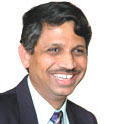| Prasad Kaipa, Ph.D. |
 |
| Mark Kriger, Ph.D. |
 |
Each
one of us has different ways of knowing and different ways of accessing
that knowledge to inform our decisions and actions. Our observation from
working with senior executives is that most of us do not really know what
we know and how we have come to know it. The general belief is that executive
leaders use primarily rationality and logic based knowledge to make informed
decisions.
Through our work with over one hundred Chief Executive Officers, and other
leaders over a period of more than 20 years, we have discovered that leaders
have different levels of awareness about their own knowing, knowledge,
decision-making process and actions. It is fair to say that most CEOs
and senior executives do not necessarily make decisions based on the facts
alone but on internal processes that -- they claim -- are important to
them.
It is also true that people make different decisions when they are in
their ‘fundamental state of leadership’ versus in their ‘normal
state of leadership’. In a fundamental state, they are in touch
with their deeper aspirations, and challenges, whereas in a normal state,
they operate based on standards, ideals and other conditioned reflexes.
So the person who knows and the person who describes what they know —
are ‘different.’
We would appreciate your assistance in this on-going project.
If you know of leaders who you think will bring different perspective to our project and who are extraordinarily accomplished in business, science/technology or arts, please let us know. We are looking for leaders both in the West and the East to interview. Particularly, we are interested in people who have worked across multiple fields or have special wisdom that allows them to be bold and creative in bringing about major changes in their workplace or community. |
We are currently in the process of interviewing successful business executives, decision makers and political leaders from different parts of the world in order to understand and describe the processes, both inner and outer, by which they come to know what they know in attempting to manage and cope with uncertainty. We want to examine and understand the differences in and the range of ways of knowing and acting for people who are operating in different fields – such as business, arts, sports, politics, and science – in different cultures and nations, including the United States, Europe, and India/Asia.
Thank
you in advance for your participation in this project.
Prasad Kaipa
Mark Kriger